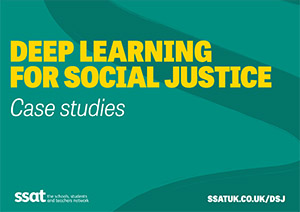
Did you know? You can access 100s of resources by becoming an SSAT member.
Login or enquire today.
Deep Learning for Social Justice – Case studies
The core principle of deep learning for social justice is to cater to the diverse needs of learners while maintaining high expectations for their success. This selection of school case studies complements the Deep Learning for Social Justice pamphlet. One such example is Acklam Grange School, where Deputy Head Jon Tait explains the success of two transformative programme: ARC services, which focuses on achievement, reintegration, and care, and the PRIDE curriculum, instilling perseverance, respect, initiative, direction, and expression in students.
Tavistock College’s Principal, Sarah Jones, shares how they overcame community challenges through a peer-to-peer development approach. The school established a mentoring space to support vulnerable students, fostering emotional and academic growth, and promoting engagement within the school community.
Blessed Edward Bamber Catholic Multi Academy Trust, led by CEO Stephen Tierney, addresses the psychological impact of disadvantage by implementing the ‘healthy minds, healthy mindsets’ programme, empowering young “heroes” to mentor and guide their peers effectively.
Kingsford Community College prioritises formative assessment, actively participating in the EFA project, which enables teachers to reflect on their practice and collaborate in a supportive environment.
Lemington Riverside Primary, under the leadership of Headteacher Craig Heeley, achieved remarkable success in recruitment by conveying the school’s value and excitement, leading to an impressive number of candidates applying for the positions.
Finally, Bristnall Hall Academy, through Assistant Principal Abby Bayford, emphasises the significance of lead practitioner learning centres and their impact on staff learning, achieved by involving students in teacher briefings to share how specific activities deepened their learning.
“Deep Learning for Social Justice” is a publication by SSAT (Schools, Students, and Teachers network), an organisation dedicated to improving outcomes for young people. With a focus on school improvement and innovation, SSAT collaborates with schools and academies in the UK and internationally.
Recommended reading
Deep Learning for Social Justice
This pamphlet highlights "deep learning for social justice" and emphasises individual needs, avoiding excessive assessments, and prioritising student success through numeracy, literacy, metacognition, self-determination, and formative assessment.
Read moreSSAT Membership
Join SSAT to gain free access to our widest range of CPD, programmes, tools and resources.

